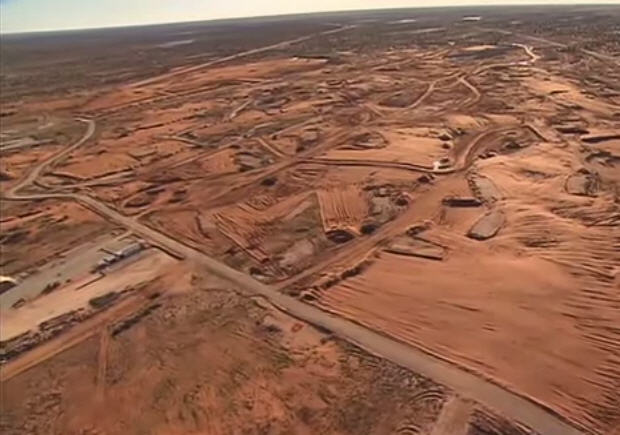Kloppers clobbers capex: Forget Olympic Dam and Jansen, BHP is now even cutting back iron ore

BHP said not that long ago that a new long-term labour deal with workers at its existing Olympic Dam operations would be key to whether a $30 billion expansion will get the nod.
That 4-year deal has now been signed but, according to The Australian, the agreement probably won’t be enough to sway BHP’s board, given its intention to cut back a $80 billion capex programme.
An extended Olympic Dam would be the world’s biggest open pit and also include the construction of 270km of powerlines, a 400 km pipeline, a new desalination plant and a 105km railway, but a JP Morgan research note out yesterday suggest it will not go ahead “for at least three or four years, if at all”.
While most analysts expect BHP will continue to pour money into iron ore – by far its most profitable business – the company may be rejigging these projects as well.
The West Australian quotes CEO Marius Kloppers speaking about Outer Harbour, BHP’s $20 billion-plus iron ore terminal expansion in Western Australia which already has government approval:
“If the iron ore price is $US200 a tonne, probably yes. If the iron ore price is $US100/t, probably no, and those are the judgments that we have got to make. Do we think it’s highly probable we will get an iron ore price of $US200/t over the next 18 months? No, I do not.
“(So) you’re probably more likely to see an outcome where you’re trying to level-peg your activity over a longer period of time rather than doing lumpy things.”
As for the $12 billion greenfield Jansen project in Canada, it was BHP’s response to the federal government of Canada’s blocking of its takeover bid for Potashcorp of Saskatchewan which along with other potash producers have been decimated on stock markets.
The company has already spent $1.2 billion to bring the project to the feasibility stage and has undertaken some construction, but in recent months BHP’s silence on Jansen has been deafening. The Globe & Mail on Thursday quotes a Kloppers interview which does not address Jansen but supplies further evidence that Jansen is off the table for now.
“You should not expect in the next six months any new major approval of projects,” Mr. Kloppers said in an interview with Caixin Media Co.
“The economics of some of these projects has changed,” he said. “I think for the next two years, 18 months perhaps, we will just wait and see how things develop.”.
It is not only BHP investors who are biting their nails over whether Olympic Dam and Jansen are going ahead or not.
MINING.com reported last week that the big miners are playing game of chicken over delaying new supply to the market.
New research shows marginal producers of iron ore, zinc, thermal coal, ferrochrome, nickel and aluminium can’t turn a profit at today’s prices and a little help from the market leaders to prop up prices would be most welcome.
Read more about the mining industry’s new normal >>
Image of Olympic Dam construction site from 7News broadcast.
{{ commodity.name }}
{{ post.title }}
{{ post.date }}




4 Comments
Eggbert Woogleheim
“Take a trip to the Middle East my friend. Takes a bomb just to get a cuppa tea. Takes a miracle to get sugar with that”
Am I to take it, that you are suggesting there is more money in exporting tea and sugar to the middle east?
Dom
Expect more of this sort of news, especially in Australia. It costs a bomb to do everything here, which fundamentally changes the economics of major projects, especially in a market with softening prices. We are a high cost location to construct, to find labout, to pay it when you do, we have more paid leave than most countries, lower unemployment so fewer available skills placing more upwards pressure on wages. All our mining assets are in place where the skills are not, we fly them in and out or pay them more to live rough locally. Our government is hell bent on raising taxes, carbon taxes, mining taxes. Its going to get tougher and tougher to make the sort of returns a mining business needs to warrent multi-billion dollar investments. We’re in for a bumpy ride I think.
2ndOrion
People will always need commodities. Where companies have the money to hold on, it is best for them to prepare projects for the time when prices will be much higher because of the over printing of money to fill budget gaps of governments for collateral they do not have. Then when the prices of the commodities go up to allow working of lower grade projects, the projects will be ready.
In the meantime the costs of some things – like labor and supplies will drop because it was not needed in the meantime. When the governments find out that they will not get all of the taxes they are looking for from mining – they will look elsewhere, for money, like print more of the stuff.
If the Companies have sufficient cash to carry over the lull, it is best to devote it to advanced Research and Development to improve the cost of working the lower grade projects. This all can be done – with sufficient cash. Then when the countries have overprinted, the commodities are at the companies’ disposal to begin production operations at much higher prices, whilst the operations were put in place at the lower prices.
Jonas_Barbarossa
Hehehe. Takes a bomb hey? Take a trip to the Middle East my friend. Takes a bomb just to get a cuppa tea. Takes a miracle to get sugar with that.